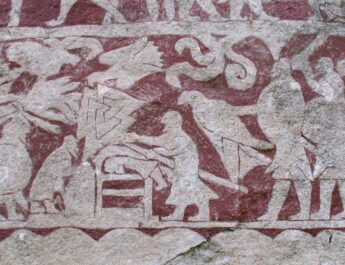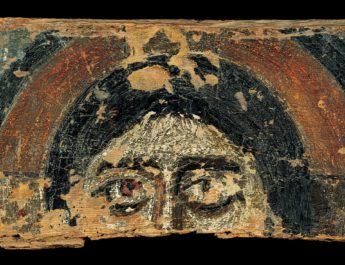James 1:17-27
Ordinary B40
17 Every generousA act of giving,B with every perfectC gift,D
A “generous” = agathos. This is good, a benefit, or a good thing. It is good by its very nature, intrinsically good. A different word, kalos, refers to external signs of goodness.
B “act of giving” = dosis. 2x in NT. From didomi (give, offer, place, bestow, deliver; give in a literal or figurative sense). This is giving itself or what is given – a gift or donation.
C “perfect” = teleios. 19x in NT. From telos (an end, aim, purpose, completion, end goal, consummation, tax). This is going through the steps to complete a stage or phase and then moving on to the next one. This is reaching an end and so being complete or “perfect.” It is also full grown or mature.
D “gift” = dorema. Related to “act of giving” in v17. 2x in NT. From doreomai (to give, donate, give freely); from doron (gift, offering, sacrifice; emphasizes that the gift is given freely, voluntarily); from didomi (see note B above). This is a gift or bounty.
is from above,E coming downF from the FatherG of lights,H
E “from above” = anothen. 13x in NT– this is the word used in John 3:3 in the being born “from above”/“again” conversation between Jesus and Nicodemus.. From ano (up, above, up to the top, things above, heaven); from ana (up, upwards, again, back, among, anew). This is from above, from the top, again, beginning, from the source. It implies anew.
F “coming down” = katabaino. From kata (down, against, throughout, among) + baino (to walk, go). This is to come down whether from the sky to the ground or from higher ground to lower. It can be used in a literal or figurative sense.
G “Father” = Pater. This is father in a literal or figurative sense. Could be elder, senior, ancestor, originator, or patriarch.
H “lights” = phos. From phao (to shine or make visible, especially with rays of light); from the same as phaino (to bring light, cause to appear, shine, become visible or clear). This is light, a source of light, fire, or radiance. This is light with specific reference to what it reveals. It is luminousness whether natural or artificial, abstract or concrete, literal or figurative.
with whom there is no variationI or shadowJ due to change.K
I “variation” = parallage. 1x in NT. From para (by, beside, in the presence of) + allasso (to change, transform) {from allos (other, another; another of a similar kind or type)}. This is change, variation, or fickleness. IT is the way something changes as in an orbit.
J “shadow” = aposkiasma. 1x in NT. From apo (from, away from) + skiazo (to overshadow, to cast shade) OR from apo (from, away from) + skia (shadow, thick darkness, outline; figurative for a spiritual situation that is good or bad). This is a shadow. It can be shade from an object or something that is faintly seen.
K “change” = trope. 1x in NT. From trepo (to turn). This is a turn or shift. It is related to something revolving. Figuratively, it is variation.
18 In fulfillment of his own purposeL he gave us birthM by the wordN of truth,O so that we would become a kind of first fruitsP of his creatures.Q
L “fulfillment of his own purpose” = boulomai. This is to wish, desire, intend. Also, to plan with great determination.
M “gave…birth” = apokueo. 2x in NT. From apo (from, away from) + kuma (wave, billow, curve, bend); {from kuo (to swell as one pregnant)}. This is to give birth or produce. It is language from the medical realm. It can also figuratively mean to generate.
N “word” = logos. From lego (to speak, tell, mention). This is word, statement, speech, analogy. It is a word that carries an idea or expresses a thought, a saying. It could refer to a person with a message or reasoning laid out in words. By implication, this could be a topic, line of reasoning, or a motive. It can be used for a divine utterance or as Word – Christ.
O “truth” = aletheia. From alethes (true, unconcealed; true because it is in concert with fact and reality – attested; literally, what cannot be hidden; truth stands up to test and scrutiny and is undeniable, authentic). {from a (not, without) + lanthano (unnoticed, concealed)}. Truth is literally that which is not or cannot be concealed. This word covers more than the sense of true versus false. It spoke of truth as that which corresponds to reality – reality as opposed to illusion. Thus, it includes, sincerity, straightforwardness, and reality itself.
P “first fruits” = aparche. 8x in NT. From apo (from, away from) + arche (origin, beginning, rule; can refer to the power of a magistrate or a king; it is the first thing as being the starting point or the most important); {from archomai (to begin or rule); from archo (to rule, begin, have first rank or have political power)}. This is first fruit or gift. It is the beginning of sacrifice – so the first crops of the season. It is also used figuratively of early converts in a specific location.
Q “creatures” = ktisma. 4x in NT. From ktizo (to build, create, form, shape; God’s acts of creation); probably akin to ktaomai (to get, purchase, possess). This is something that was created – a creature or product.
19 You must understandR, S this, my beloved:T
R “understand” = eido. This is to know, consider perceive, appreciate, behold, or remember. It means seeing with one’s eyes, but also figuratively, it means perceiving – seeing that becomes understanding. So, by implication, this means knowing or being aware.
S {untranslated} = adelphos. From a (with, community, fellowship) + delphus (womb). This is a brother in a literal or figurative sense. It is also used of another member of the Church.
T “beloved” = agapetos. From agape (love, goodwill, benevolence; God’s divine love); from agapao (to love, take pleasure in, esteem; to prefer). This is Beloved or very dear one. It is a title for the Messiah, but also for Christians. Properly, this is one who personally experiences God’s love.
let everyoneU be quickV to listen,W slowX to speak, slow to anger;Y
U “everyone” = anthropos. Probably from aner (man, male, husband) + ops (eye, face); {from optanomai (to appear, be seen); perhaps from horao (become, seem, appear)}. This is human, humankind. Used for all genders.
V “quick” = tachus. 1x in NT. This is quickly, promptly; without unreasonable delay.
W “listen” = akouo. This is hear or listen, but it also means to understand by hearing. This is where the word “acoustics” comes from.
X “slow” = bradus. 3x in NT – used here and in the walk to Emmaus in the phrase “slow of heart to believe” in Luke 24:25. This is slow, dull, unhurried.
Y “anger” = orge. From orgao (something that teems or stews; anger rising from prolonged personal contact that is fixed rather than an angry outburst; anger that stems from an individual’s sense of right and wrong, justice, etc.) or from orego (to stretch out towards, yearn for, aspire to, desire). This is impulse, wrath, anger, passion, punishment. Properly, this is fixed anger from ongoing personal irritation caused by something the one getting angry sees as unjust or evil. Wrath implies punishment. Can refer to human or divine wrath.
20 for yourZ anger does not produceAA God’sBB righteousness.CC
Z “your” = aner. Related to “everyone” in v19. See note U above.
AA “produce” = ergazomai. From ergon (work, task, action, employment). This is to work, labor, perform, toil.
BB “God’s” = Theos. From Proto-Indo-European origins, meaning do, put, place. This is God or a god in general.
CC “righteousness” = dikaiosune. From dikaios (correct, righteous – implies innocent; this is that which conforms to God’s notion of justice, uprightness); from dike (the principle of justice; that which is right in a way that is very clear; a decision or the execution of that decision; originally, this word was for custom or usage; evolved to include the process of law, judicial hearing, execution of sentence, penalty, and even vengeance; more commonly, it refers to what is right); may be from deiknumi (to show, point out, exhibit; figurative for teach, demonstrate, make known). This is judicial or divine approval of character or action. This is righteousness, justice, justness, divine righteousness.
21 Therefore ridDD yourselves of all sordidnessEE and rank growthFF of wickedness,GG
DD “rid” = apotithemi. 9x in NT. From apo (from, away from) + tithemi (to put, place, set, fix, establish in a literal or figurative sense; properly, this is placing something in a passive or horizontal position). This is to put aside, put away, renounce.
EE “sordidness” = rhuparia. 1x in NT. From rhuparos (dirty, foul, cheap, wicked); from rhupos (dirt, squalor; specifically, this is greasy dirt that clings; figuratively, it is the stain from doing something wrong, depravity). This is filth, dirt, moral turpitude.
FF “rank growth” = perisseia. 4x in NT. From perisseuo (more than what is ordinary or necessary; abounding, overflowing, being leftover, going above and beyond; super-abounding in number or quality); from perissos (abundant, more, excessive, advantage, vehemently); from peri (all-around, encompassing, excess). This is abundance, surplus – it is more than expected.
GG “wickedness” = kakia. 11x in NT. From kakos (bad, evil, harm, ill; this is evil that is part of someone’s core character – intrinsic, rotted, worthless, depraved, causing harm; it is deep inner malice that comes from a rotten character). This is wickedness, evil, trouble, misfortune, inner malice, badness. It is inherent evil, depravity, causing harm.
and welcomeHH with meeknessII the implantedJJ word that has the powerKK to saveLL your souls.MM
HH “welcome” = dechomai. This is to warmly receive, be ready for what is offered, take, accept, or welcome. It is to receive in a literal or figurative sense.
II “meekness” = prautes. 12x in NT. From praus (gentle, meek, which implies humility); related to praios (meek, gentle, kind); related to praotes (mildness kindness, meekness; being temperate – gentle, but strong; implies humility). This is gentleness, mildness, meekness, or humility. It is strength mixed with gentleness.
JJ “implanted” = emphutos. 1x in NT. From emphuo (to implant); {from en (in, at, by, with) + phuo (to produce, spring up, grow, germinate; perhaps originally meaning puff or blow)}. This is implanted, congenital, natural, engraft, established. It is joined together to help something grow.
KK “has the power” = dunamai. This is to be able, or something that is possible. It can also be empowered or being powerful. The Greek word for “miracle” (dunamis) comes from this root.
LL “save” = sozo. From sos (safe, rescued, well). This is to save, heal, preserve, or rescue. Properly, this is taking someone from danger to safety. It can be delivering or protecting literally or figuratively. This is the root that “savior” and “salvation” come from in Greek.
MM “souls” = psuche. From psucho (to breathe, blow). This is breath, the breath of life, the self, individual, soul. This is the word for that which makes a person unique – their identity, will, personality, affections. This isn’t the soul as the immortal part of us, but as our individuality. It is also not life as a general concept, but specific to people. This is where the words psyche and psychology come from.
22 But beNN doersOO of the word, and not merelyPP hearersQQ who deceiveRR themselves.
NN “be” = ginomai. This is to come into being, to happen, become, be born. It can be to emerge from one state or condition to another or is coming into being with the sense of movement or growth.
OO “doers” = poietes. 6x in NT. From poieo (to make, do, construct, accomplish). This is a maker or doer. It can also mean poet, author, or performer. This is where the word “poet” comes from.
PP “merely” = monon. From monos (alone, single, remaining, mere, desolate); from meno (to stay, abide, wait, endure). This is merely, only, simply, sole. It can also imply alone.
QQ “hearers” = akroates. Related to “listen” in v19. 4x in NT. From the same as akroaterion (place to hear or hold an audience; auditorium, court room); {from akraomai (to listen); perhaps from akouo (see note W above) + –terion (a place)}. This is a hearer.
RR “deceive” = paralogizomai. Related to “word” in v18. 2x in NT. From para (by, beside, in the presence of) + logizomai (this is to compute or reckon up, to count; figuratively, it is coming to a conclusion or decision using logic; taking an inventory in a literal or figurative sense); {from logos (see note N above)}. This is to use reason that distorts the truth, to miscalculate, deceive, mislead, delude. It can be reasoning that appears sound, but is in reality distorted.
23 For if any are hearers of the word and not doers, they are like thoseSS who lookTT at themselvesUU in a mirror;VV 24 for they look at themselves and, on going away, immediatelyWW forgetXX what they were like.
SS “those” = aner. Same as “your” in v20. See note Z above.
TT “look” = katanoeo. 14x in NT. From kata (down, against, throughout, among) + noeo (to think, understand, conceive, realize, see; one who thinks things through sufficiently to reach a conclusion or value judgment; moral reasoning.); {from nous (mind, understanding, reasoning faculty, intellect, capacity to reflect); from noos (mind); probably from the base as ginosko (to know, recognize, realize, perceive, learn; gaining knowledge through personal experience)}. This is to consider, discern, perceive, notice, observe. It is to think through something thoroughly in order to come to a conclusion – fully concentrated thinking.
UU “themselves” = prosopon + ho + genesis + autos. Lit “at the face of his birth.” Prosopon is related to “everyone” in v19. From pros (at, towards, with) + ops (see note U above). This is the face, surface, or front. It can imply presence more generally. Genesis is related to “be” in v22. 5x in NT. From ginomai (see note NN above). This is origin, lineage, birth, genealogy, or life. It can be figurative for nature. This is where the word “genesis” comes from.
VV “mirror” = esoptron. Related to “everyone” in v19 & “themselves” in v23. 2x in NT. From eis (to, into, for, among) + horao (see note U above). This is a mirror or looking glass. It would not have been a mirror as we have them today, but highly polished metal that give a fuzzy reflection.
WW “immediately” = eutheos. Related to “rid” in v21. From euthus (immediately, upright, straight and not crooked); {perhaps from eu (good, well, well done, rightly) + tithemi (see note DD above)}. This is directly, soon, at once.
XX “forget” = epilanthanomai. Related to “truth” in v18. 8x in NT. From epi (on, upon, against, what is fitting) + lanthano (see note O above). This is to overlook, forget, neglect. It can particularly refer to the impact of not noticing something.
25 But those who lookYY into the perfect law,ZZ the law of liberty,AAA and persevere,BBB
YY “look” = parakupto. Related to “gave…birth” = in v18. 5x in NT. From para (by, beside) + kupto (to stoop, bend forward, bow one’s head); perhaps from kuma (see note M above). This is to bend beside or stoop. To bend over to peer into.
ZZ “law” = nomos. From nemo (to parcel out). Literally, this is that which is assigned. It can be usage, custom, or law. This word can be used for human or divine law. It can be used specifically for the law of Moses or as a name for the Torah (the first five books of the Bible). Sometimes it is used for scripture as a whole, used of the Gospel, or of any theology. It is also used for the “tradition of the elders,” which would be the oral Torah – the tradition of the laws plus their interpretations as they were passed down over time. We must carefully consider which meaning of “law” is meant when we interpret passages the word is found in.
AAA “liberty” = eleutheria. 11x in NT. From eleutheros (a free person, at liberty, not a slave; properly, unshackled – figuratively, it is one who has the freedom to choose their destiny. Also, it is one who does not have obligation or liability); probably from erchomai (to come or go). This is liberty or freedom. Particularly, it would be release from slavery. It can also refer to moral freedom.
BBB “preserve” = parameno. Related to “merely” in v22. 4x in NT. From para (by, beside, in the presence of) + meno (see note PP above). This is to remain beside or near, abide with, or continue. Figuratively, it’s persevere in. It could also be maintaining an ongoing close relationship or partnership.
being not hearers who forgetCCC but doers who actDDD—they will be blessedEEE in their doing.FFF
CCC “forget” = epilesmone. Related to “truth” in v18 & “forget” in v24. 1x in NT. From epilanthanomai (see note XX above). This is forgetfulness or negligence. IT can also refer to not noticing something.
DDD “doers who act” = poietes + ergon. Literally “a doer of the work.” Poietes is the same as “doers” in v22. See note OO above. Ergon is related to “produce” in v20. See note AA above.
EEE “blessed” = makarios. From makar (happy); from mak– (to become long or large). This is blessed, happy, fortunate. It is when God’s grace/abundance is extended.
FFF “doing” = poiesis. Related to “doers” in v22. 1x in NT. From poieo (see note OO above). This is an action, performance, or deed.
26 If any thinkGGG they are religious,HHH and do not bridleIII their tonguesJJJ
GGG “think” = dokeo. From dokos (opinion). This is to have an opinion, seem, appear, think, suppose. It deals with a personal judgment. This is the root of the word “doxology.”
HHH “religious” = threskos. 1x in NT. Probably from the base of throeo (to be disturbed, unsettled, troubled; feeling the desire to scream from fear, very upset, startled); from throos (noise, tumult). This is religious, devout, or pious. It is one who carefully adheres to religious requirements.
III “bridle” = chalinagogeo. 2x in NT – both in James. From chalinos (bridle, bit); {from chalao (let down, slacken, loosen); from the base of chasma (gap, gulf, chasm, open space); from chasko (to gape, yawn).)} + ago (lead, bring, carry, drive, go). This is to bridle or restrain. It emphasizes the way that a bridle leads or curbs the one who is bridled.
JJJ “tongues” = glossa. Root refers to a point that sticks out. This is tongue in a literal sense, but can also refer to language or a nation that speaks a different language. Figuratively, it can also refer to speaking in tongues or speech inspired by the Spirit.
but deceiveKKK their hearts,LLL their religionMMM is worthless.NNN
KKK “deceive” = apatao. 3x in NT. From apate (deception, cheating, treachery, fraud). This is to deceive, seduce, cheat, delude. It focuses on the method used to lure astray.
LLL “hearts” = kardia. Literally the heart, but figuratively mind, character, inner self, will, intention, thoughts, feelings. Also, the center of something. The word heart is only used figuratively in the Old and New Testaments. This is where “cardiac” comes from.
MMM “religion” = threskeia. Related to “religious” in v26. 4x in NT. From threskos (see note HHH above). This is religion or worship. Specifically, it refers to ritual observance.
NNN “worthless” = mataios. 6x in NT. From the same as maten (in vain, aimlessly, pointless, fruitless); from mate (a folly) or from massaomai (to chew, gnaw); {from masso (to kneed, squeeze). This is vain, useless, worthless, unproductive, or purposeless. It can also figuratively mean fleeting or refer to idols.
27 Religion that is pureOOO and undefiledPPP before God, the Father, is this: to care forQQQ orphansRRR
OOO “pure” = katharos. This is clean, clear, pure, unstained; clean in a literal, ritual, or spiritual sense; so, also guiltless, innocent or upright; something that is pure because it has been separated from the negative substance or aspect; spiritually clean because of God’s act of purifying.
PPP “undefiled” = amiantos. 4x in NT. From a (not, without) + miaino (to stain, corrupt, pollute; literally, to stain or dye; figuratively, to defile as sin taints one; to contaminate ritually or morally). This is undefiled, unstained, unsoiled. Figuratively, this means pure.
QQQ “care for” = episkeptomai. 11x in NT. From epi (on, upon, at, what is fitting) + the base of skopos (a mark or goal like the marker at the end of a race; figuratively, other goals or destinations; also, a watch or sentry); {from skeptomai (to peer out, consider, gaze carefully); perhaps related to skapto (to dig or excavate)}. This is to look at, look out for, see, select, visit.
RRR “orphans” = orphanos. 2x in NT. This is an orphan, more specifically one without a father. Figuratively, it can refer to anyone who is bereaved or beyond being comforted. It is where the word “orphan” comes from.
and widowsSSS in their distress,TTT and to keepUUU oneself unstainedVVV by the world.WWW
SSS “widows” = chera. Related to “bridle” in v26. Perhaps from the base of chasma (see note III above). This is widow literally or figuratively.
TTT “distress” = thlipsis. From thlibo (to press in on and make narrow, rub together, constrict; figuratively to oppress or afflict). This is pressure that hems us in – used often of internal pressure that makes us feel like we have no other options and are confined or restricted. So, this is persecution, affliction, trouble, distress, and anguish. There is a different word, stenoxoria, that refers to external pressure that we feel from what’s going on.
UUU “keep” = tereo. From teros (a guard or a watch that guards keep); perhaps related to theoreo (gazing, beholding, experiencing, discerning; looking at something to analyze it and concentrate on what it means; the root of the word “theatre” in that people concentrate on the action of the play to understand its meaning); from theaomai (to behold, look upon, see, contemplate, visit); from thaomai (to gaze at a spectacle; to look at or contemplate as a spectator; to interpret something in efforts to grasp its significance); from theoros (a spectator or envoy). This is to guard, observe, keep, maintain, or preserve. It can also be used figuratively for spiritual watchfulness. It is guarding something from being lost or harmed – keeping an eye on it. Contrast the Greek phulasso, which is to guard something so that it doesn’t escape. Also contrast koustodia, which generally denotes a fortress or military presence. This word can mean fulfilling commands, keeping in custody, or maintaining. It can also figuratively mean to remain unmarried.
VVV “unstained” = aspilos. 4x in NT. From a (not, without) + spiloo (this is to stain or defile; figuratively, it can refer to spiritually defile or pollute, a defect or disgrace). This is spotless, undefiled, or pure. Figuratively, it is morally pure.
WWW “world” = kosmos. Perhaps from the base of komizo (to carry, convey, recover); from komeo (to take care of). This is order, the world, the universe, including its inhabitants. Literally, this is something that is ordered so it can refer to all creation. It can also refer to decoration in the sense that something is better ordered and, thus, made more beautiful. This is where “cosmos” and “cosmetics” come from.
Image credit: “Helping Hand” by Judit Klein, 2011.




